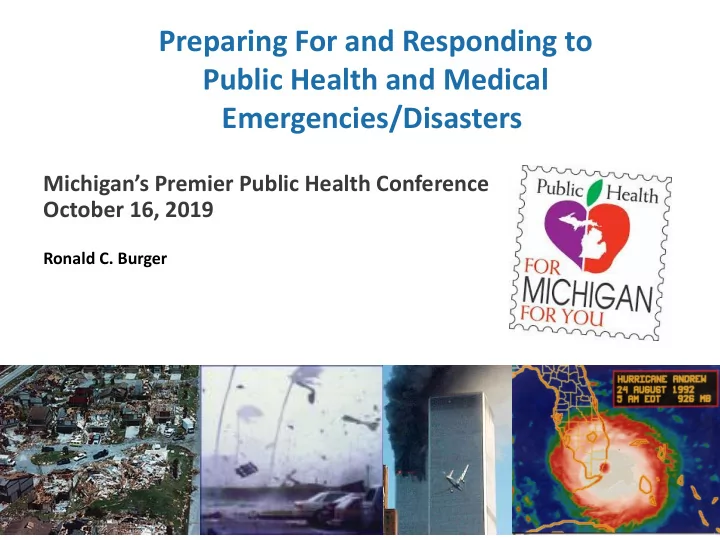

Preparing For and Responding to Public Health and Medical Emergencies/Disasters Michigan’s Premier Public Health Conference October 16, 2019 Ronald C. Burger
The first emergency preparedness and response to disasters:
What is an Emergency? An Emergency is , “An unscheduled, serious occurrence or situation urgently requiring prompt action.” - Webster’s II, New Riverside Dictionary It is an unscheduled event; it is not unplanned!
Why are we: Public Health Ready?
Why are we Public Health Ready? Because an emergency threatens people’s basic needs: Electricity Health and Medical Care Communications Safe and adequate food, water and shelter Safety Threats to those needs impact public health.
Preparedness for natural disasters, technological problems, and terrorism is necessary for rapid public health assistance. • Natural Problems • Floods • Severe Heat/Cold • Disease Clusters/ Outbreaks • Drought • Fires • Avalanche
Preparedness for natural disasters, technological problems, and terrorism is necessary for rapid public health assistance. • Technological Problems • Radiation • Hazardous Chemical • Oil • Biological • Water Systems
Preparedness for natural disasters, technological problems, and terrorism is necessary for rapid public health assist ance. • Terrorism • Chemical • Biological • Radiological • Nuclear • Explosion Bioterrorism Bioterrorism
Disasters, terrorism and other public health emergencies all require rapid mobilization of resources and experts across agencies and across jurisdictional lines.
The American Public Health System is defined by its Partnerships S L F O E T C D A A E T L R E A L
An all-hazards approach means responding in the same way to every incident. Kelly, as you look over ground zero, close your eyes — now, that could be the result of a hurricane, tornado, unintentional explosion, or two planes intentionally flying into two buildings. Public health is responding the same know matter how the cat got out of the bag. Ron Burger, CDC, September 13, 2001, Ground Zero to Kelly McKinney, NYCDHMH Environmental Health Incident Commander
Public Health & Medical Issues After a Public Health Emergency
Public Health & Medical Issues After a Public Health Emergency 1- Rapid Assessment of Health and Medical Care Delivery
Public Health & Medical Issues After a Public Health Emergency 2- Delivery of Health and Medical Care
Public Health & Medical Issues After a Public Health Emergency 3- Community Assessment for Public Health Emergency Response (CASPER): Public Health and Emergency Management Tool
Public Health & Medical Issues After a Public Health Emergency 4- Special Medical Needs Shelter (SpNS): site; staff; supplies; Federal Medical Stations
Public Health & Medical Issues After a Public Health Emergency 5- Injury & Illness Surveillance and Follow-up: Epidemiology and Strike Teams Injuries and Illnesses Related to Hurricane Andrew 1992 Surveillance for Illness WORLD TRADE CENTER and Injury After SURVEILLANCE Hurricane Katrina --- Eye injuries (12%) New Orleans, Louisiana, Lung injuries (11%) Headache (8%) September 8--25, 2005 Blisters (5%) Sprains/strains (5%)
Public Health & Medical Issues After a Public Health Emergency 6- Laboratory: routine and special needs
Public Health & Medical Issues After a Public Health Emergency 7- Isolation (ill)- Quarantine (exposed not ill) Measures
Public Health & Medical Issues After a Public Health Emergency 9- Potable Water, Safe Food, and Sanitation and Hygiene: shelters; comfort stations; medical care areas
Public Health & Medical Issues After a Public Health Emergency 10- Vector Control: stinging/biting critters
Public Health & Medical Issues After a Public Health Emergency 11- Solid Waste: household refuse; hazards and critters
Public Health & Medical Issues After a Public Health Emergency 12- Hazardous Materials: household; plants; stores
Public Health & Medical Issues After a Public Health Emergency 13- Decontamination/ Environmental Surety: hazmat; molds
Public Health & Medical Issues After a Public Health Emergency 14- Worker health and safety: we are all workers
Public Health & Medical Issues After a Public Health Emergency 15- Behavioral Health: Critical Incident Stress Management
Public Health & Medical Issues After a Public Health Emergency 16- Sheltering and Housing: Mass Congregation; needs injury/illness surveillance
Public Health & Medical Issues After a Public Health Emergency 17- Animal Health, Care, and Sheltering NDMS-NVRT, VMATs, Animal Control, ASPCA, HSUS; pet-friendly shelters
Public Health & Medical Issues After a Public Health Emergency 18- Handling of Deceased (humans and animals) = Mass Fatalities Management
Public Health & Medical Issues After a Public Health Emergency 19- Staffing/Surge Capacity
Public Health & Medical Issues After a Public Health Emergency 20- Rumor Control: take care of before it becomes a fact
Public Health & Medical Issues After a Public Health Emergency 21- Registries: keeping track
Public Health & Medical Issues After a Public Health Emergency 22- Public Information and Risk Communication • - Be first • - Be right • - Be credible
Public Health & Medical Issues After a Public Health Emergency 23- Political Science: parade of the dignitaries; politicians; the Boss
All emergencies are local. First responders may be your next door neighbors.
Emergency public health is not a new public health activity. It is a new public health priority. • Different culture • Different way of doing business • Involves national security and law enforcement
Globalization has impacted public health. Our neighbors are not just down the street — they are around the world.
Public health works to assure the conditions so that even people impacted by a disaster can still live, work, play, learn and worship safely and healthfully!
Thank you for your attention! Ron Burger 850-728-3304 disasterdude15@gmail.com
Recommend
More recommend